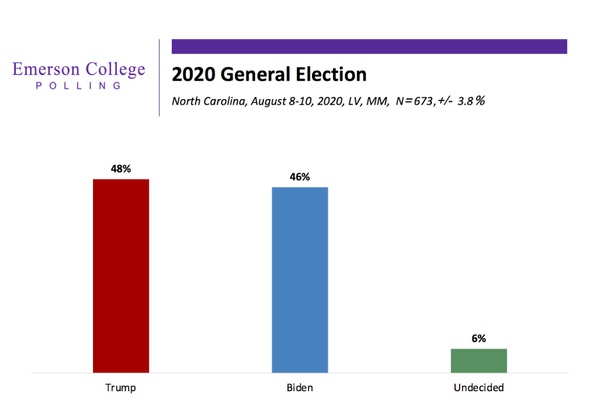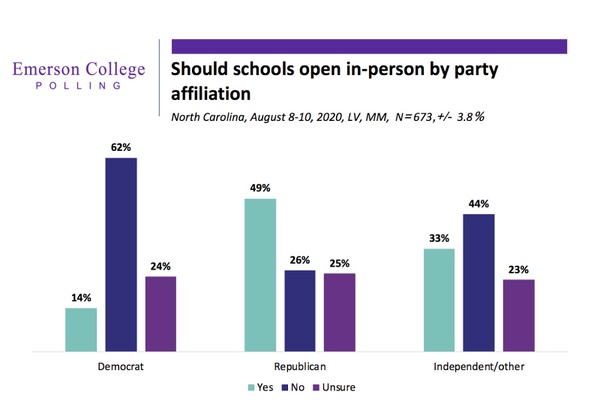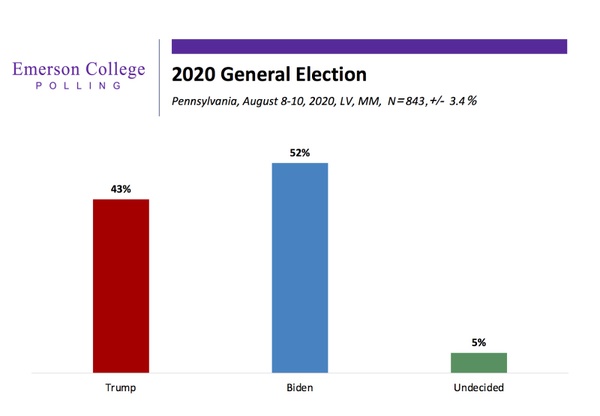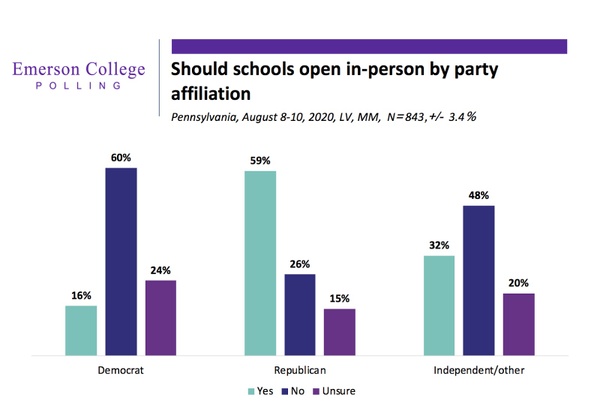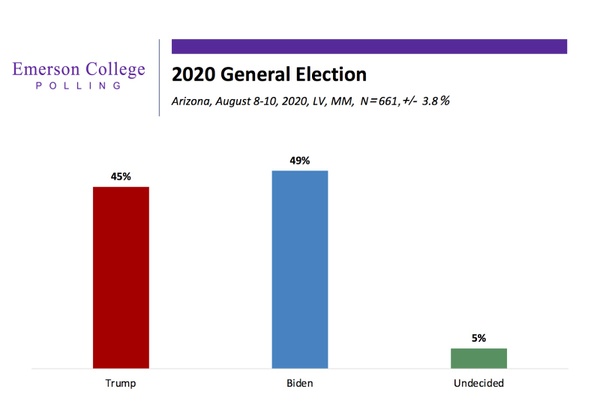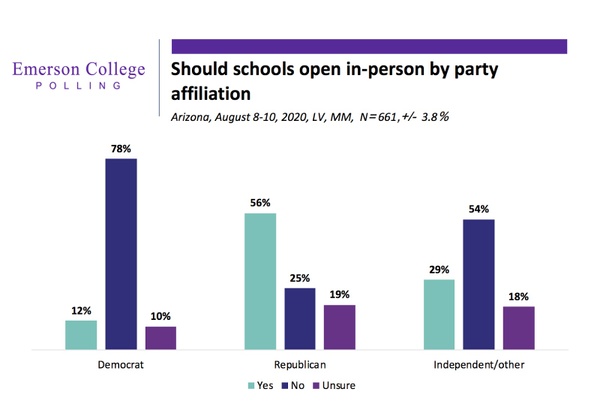North Carolina 2020:
The latest Emerson College poll of North Carolina voters finds President Trump with a small lead in the presidential race, with 48% of the vote compared to former Vice President Joe Biden who is at 46%. Six-percent (6%) of voters remain undecided. Of those who are undecided, 41% are leaning towards voting for President Trump, and 59% are leaning towards Biden.
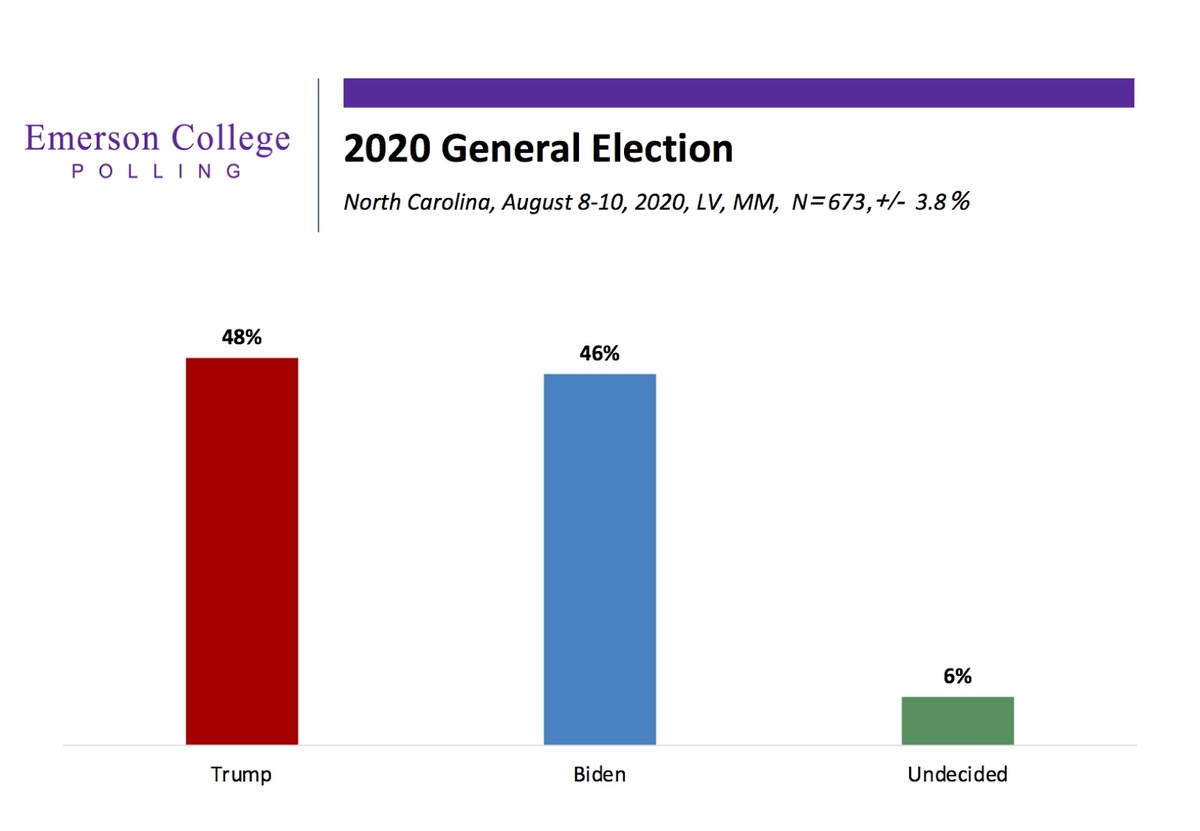
Regarding what method they plan on using to vote in November, 75% of North Carolina voters plan to vote in-person, while 25% are voting by-mail. Of those who are voting in-person, 58% plan to vote for President Trump. Among voters who will vote-by-mail, 72% plan to vote for Biden.
A majority of the state’s voters, 51%, approve of the job that President Trump is doing, compared to 46% who disapprove and 3% who are neutral.
Democratic Governor Roy Cooper also has a majority approval rating of 52% approval, with 38% disapproval and 10% neutral. In Cooper’s re-election bid this November, he is currently leading Republican challenger Dan Forest by 6 points: 50% for Cooper, 44% for Forest, with 7% undecided.
In the race for US Senate, incumbent Republican Thom Tillis is trailing his Democratic opponent Cal Cunningham, with Cunningham capturing 44% of the vote compared to Tillis with 42%. A larger portion of voters, 14%, are still undecided on this race.
When asked which congressional candidate they would generally lean towards in their district, 45% of voters reported that they would lean Republican, compared to 44% that indicated they would lean towards voting for the Democratic candidate. Eleven-percent (11%) were unsure which party they would vote for.
Regarding support for a national mandate for all individuals to wear masks in public where social distancing is not possible, a majority (63%) said they would support a mask mandate, 25% said they would oppose it, and 12% were unsure.
As K-12 schools begin to reopen both in-person and virtually nationwide this month, North Carolina voters are split on the decision to reopen in-person. Forty-five percent (45%) believe schools should not be opening in-person now, while 31% say they should and 24% are unsure.
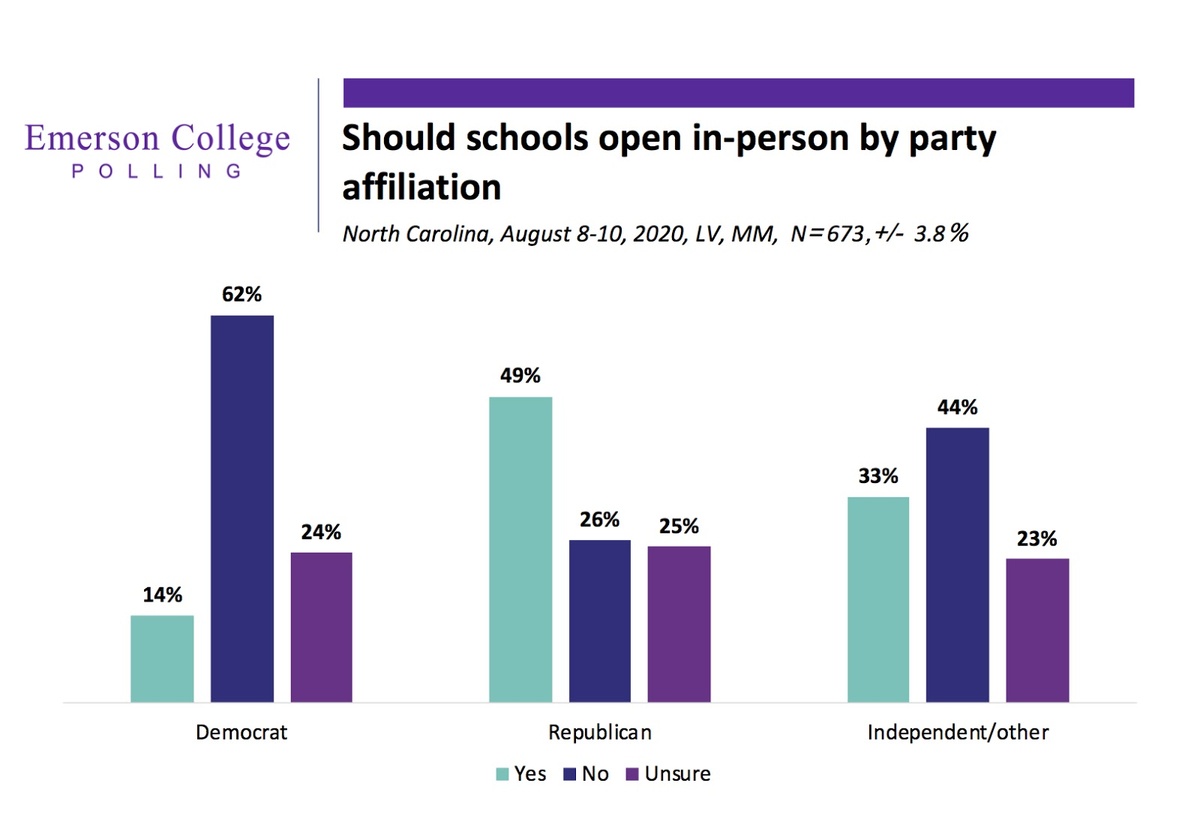
A majority (55%) of North Carolina voters also believe that the quality of an online-only education for K-12 students is comparably worse than learning in person. A slight plurality (37%) believe that, despite this, President Trump should require that all K-12 schools in the country hold classes online in the fall. Thirty-six (36%) believe he should not require online-only education, and 27% are unsure.
Caller ID
The North Carolina Emerson College poll was conducted August 8-10, 2020. The sample consisted of likely registered voters, n=673, with a Credibility Interval (CI) similar to a poll’s margin of error (MOE) of +/-3.8 percentage points. The data sets were weighted by gender, age, education, party affiliation, and race based on voter turnout modeling using the 2016 US Census Voting and Registration Supplemental data sets and 2016 official vote results. It is important to remember that subsets based on gender, age, party breakdown, ethnicity, and region carry with them higher margins of error, as the sample size is reduced. Data was collected using an Interactive Voice Response (IVR) system of landlines (n=400) and an online panel provided by MTurk (n=273).
Pennsylvania 2020:
A new Emerson College poll of Pennsylvania, a state who narrowly elected President Trump in 2016, finds that the Presidential race may not be as competitive this time around. Former VP Joe Biden is showing a nearly 10 point lead over President Trump, with 52% of voters supporting Biden and 43% supporting Trump. Few voters, 5%, remain undecided.
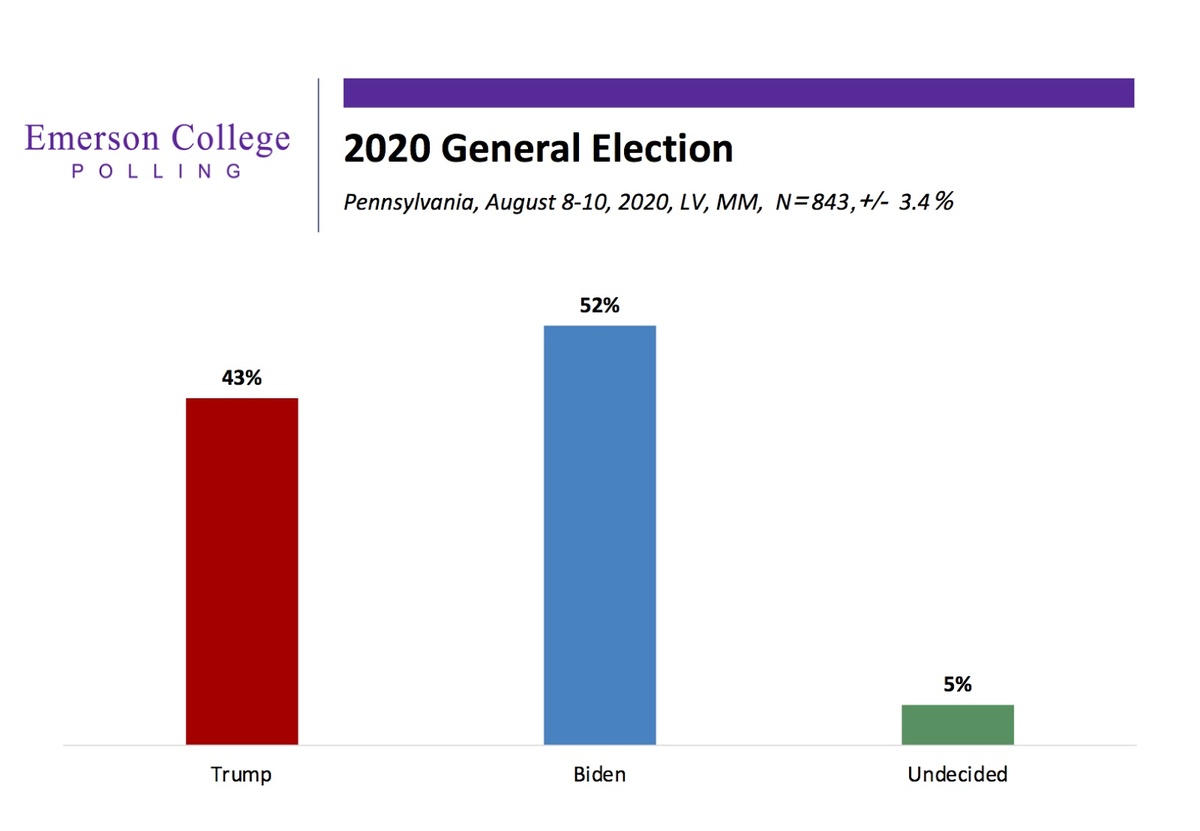
Most voters, 63%, say that they intend to vote in-person for the Presidential election. Of those who will vote in-person, 63% plan to support Trump. Of the 37% of voters who plan to vote by mail, 87% of them plan to support Biden.
President Trump’s falling support is reflected in his approval amongst voters, where 51% disapprove of the job he’s doing as President. Of the rest, 42% approve and 7% hold a neutral opinion.
In a general congressional matchup, 51% say they will support the Democratic party candidate while 39% will support the Republican party candidate. The remaining 10% of voters have yet to decide for whom they will vote for.
A majority of voters, 71%, are in favor of a national mask mandate in public where social distancing is not possible. 20% would oppose such a mandate and 8% are unsure.
On the matter of whether or not K-12 schools should reopen in-person amid the ongoing pandemic, 45% believe they should not, 35% believe they should and 20% are unsure. Amongst party lines there is disagreement on this matter, with 59% of Republicans believing schools should reopen in-person and 60% of Democrats believing they should not. Independent voters are less consolidated on this issue, with 32% believing schools should reopen, 48% believing they should not and 20% unsure.
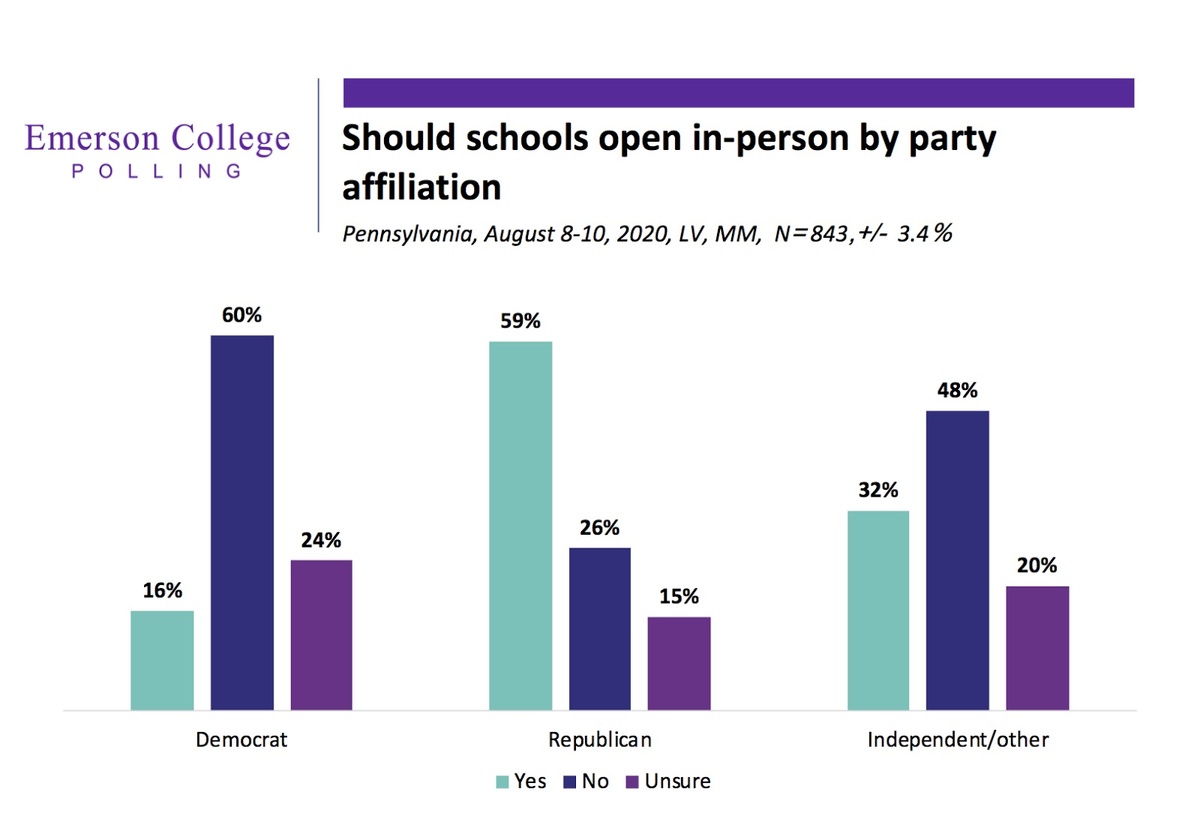
The overall sentiment on online school for K-12 students is that it does not compare to in-person learning; 62% of respondents believe that learning online is worse than learning in-person. Only 12% believe that learning online is equal to in-person instruction and the remaining 26% believe that an online education is better than that of in-person education.
Voters find themselves divided on whether President Trump should require that all K-12 schools in the country should move classes online for the fall. 36% believe he should require all schools to go online, 39% believe he should not and 26% are unsure.
The coronavirus epidemic could be a contributing factor in Pennsylvanians' decision whether to stick with President Trump or support Joe Biden in November. When asked whether the pandemic has made them more or less likely to vote for the President, 38% reported that they were less likely to vote for Trump, 28% said they were more likely and 35% said it made no difference.
A plurality of voters, 49%, reported that they trust political polling less now than they did in 2016. Only 16% of voters said they trust polling more now and 35% reported no difference in their opinion.
When asked if they are better or worse off financially today than they were four years ago, 40% reported being better off, 23% said they were worse off and 37% said they are financially about the same. Of voters who voted for Trump in 2016, 61% said they are better off now, compared to 22% of Clinton voters who said they were better off now.
A majority of Keystone State voters, 72%, said that they would not ride in a driverless car, while only 29% said they would.
Caller ID
The Pennsylvania Emerson College poll was conducted August 8-10, 2020. The sample consisted of likely registered voters, n=843, with a Credibility Interval (CI) similar to a poll’s margin of error (MOE) of +/-3.4 percentage points. The data sets were weighted by gender, age, education, party affiliation, and race based on voter turnout modeling using the 2016 US Census Voting and Registration Supplemental data sets and 2016 official vote results. It is important to remember that subsets based on gender, age, party breakdown, ethnicity, and region carry with them higher margins of error, as the sample size is reduced. Data was collected using an Interactive Voice Response (IVR) system of landlines (n=495) and an online panel provided by MTurk (n=348).
Arizona 2020:
In the latest Emerson College poll of Arizona, former Vice President Joe Biden is at 49%, with a four-point lead over incumbent President Trump who is at 45%. Five-percent (5%) of voters are still undecided, and among them, 74% are leaning towards Biden, while 26% are leaning towards Trump.
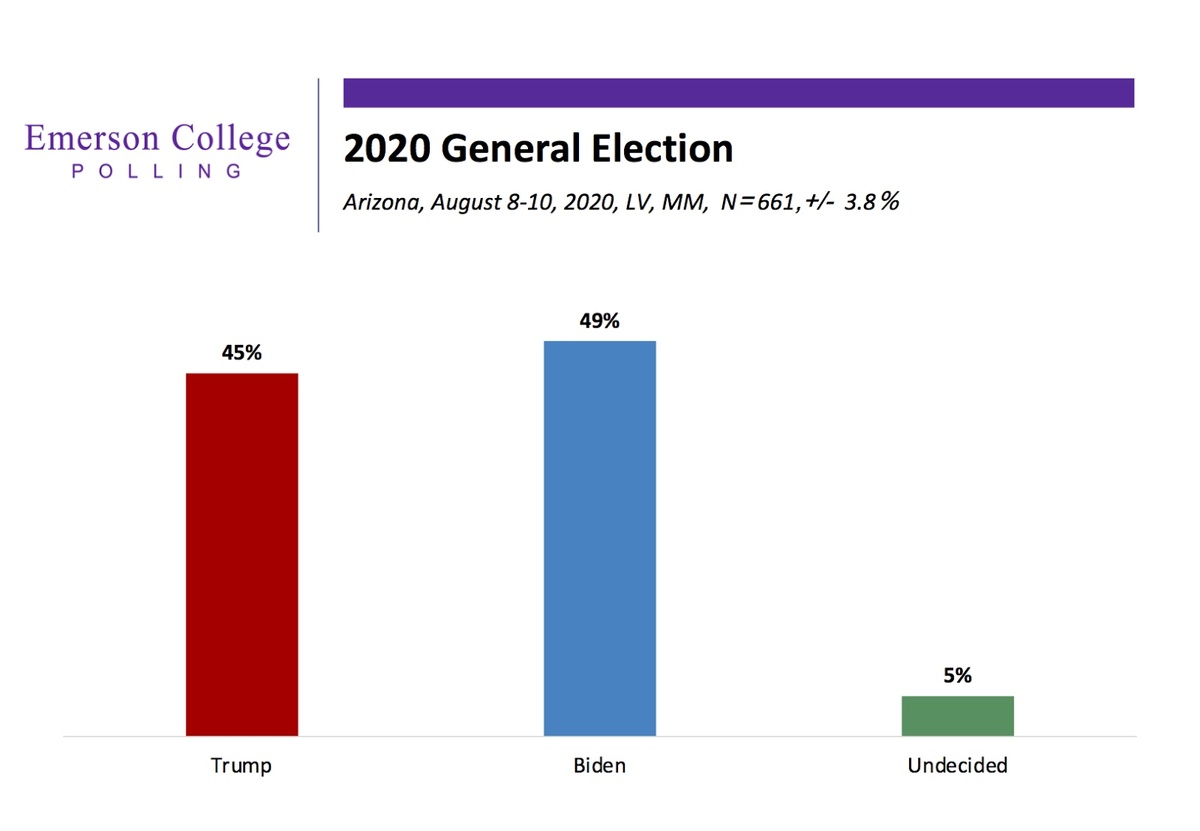
Sixty-five percent (65%) of voters in the state plan to vote by mail. Among them, 63% plan to vote for Biden, and 30% plan to vote for Trump. Among the 35% of voters that plan to vote in-person, Trump leads with 75% of the vote.
Trump’s approval in the state is underwater, with 46% approval and 51% disapproval.
In the election for US Senate, Democratic challenger Mark Kelly has a double-digit lead over Martha McSally, 52% to 41%. Seven-percent (7%) of voters are still undecided.
Democratic congressional candidates have a slight advantage in the state at this point, as 46% say they will support the Democratic party candidate in their district for US Congress, while 41% will support the Republican party candidate. The remaining 13% of voters have yet to decide for whom they will vote for.
As Arizona has become one of the hardest-hit states by the coronavirus pandemic, a strong majority (72%) of voters indicated that they would support a national mandate for individuals to wear masks in public where social distancing is not possible. This opinion crossed party lines, as 93% of Democrats, 76% of Independents, and 48% of Republicans support a mask mandate.
A majority (52%) of voters in the state also feel that K-12 schools should not open in person considering the pandemic. Voters are split on whether or not President Trump should require schools to be hosted entirely online, with 35% saying he should, 35% saying he shouldn’t, and 31% not having an opinion.
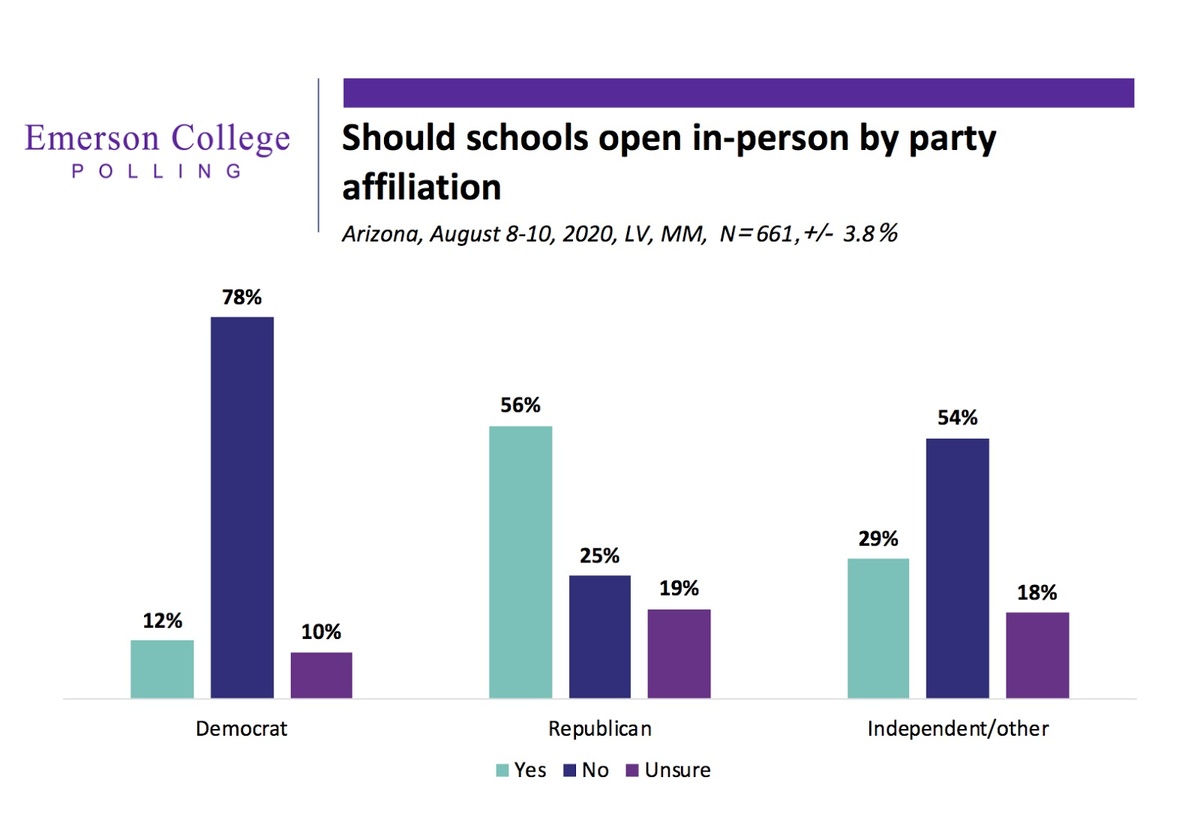
Voters are also split on how their financial state compares to how it was in 2016. Thirty-six percent (36%) feel they are better off now than in 2016, 29% say they are worse off, and 35% say they are about the same.
Caller ID
The Arizona Emerson College poll was conducted August 8-10, 2020. The sample consisted of likely registered voters, n=843, with a Credibility Interval (CI) similar to a poll’s margin of error (MOE) of +/-3.4 percentage points. The data sets were weighted by gender, age, education, party affiliation, and race based on voter turnout modeling using the 2016 US Census Voting and Registration Supplemental data sets and 2016 official vote results. It is important to remember that subsets based on gender, age, party breakdown, ethnicity, and region carry with them higher margins of error, as the sample size is reduced. Data was collected using an Interactive Voice Response (IVR) system of landlines (n=409) and an online panel provided by MTurk (n=252).

